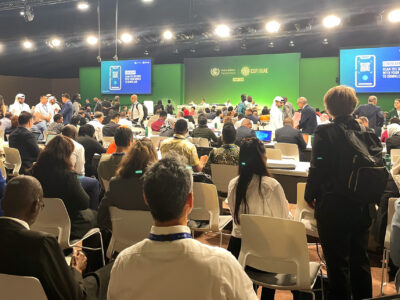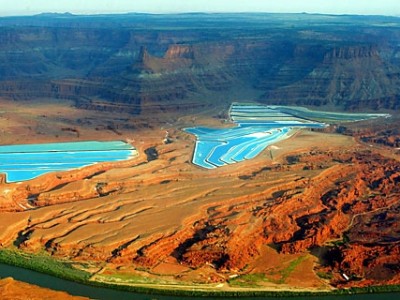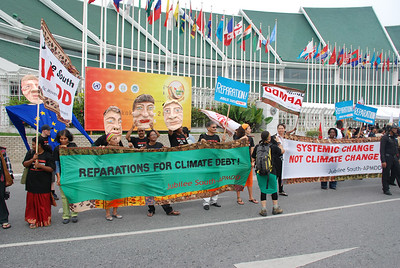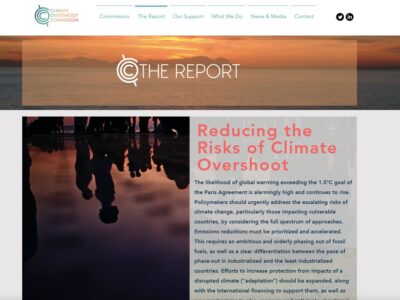International Environmental Law
COP28: “The Methane COP”
Methane was at the center of COP28. Here are some of the most relevant announcements of this year’s Conference of the Parties.
By far, the most ubiquitous figure at COP28 was that of John Kerry. The U.S. climate envoy strolled through the labyrinthine and confusing alleys of Dubai’s Expo City wearing an impeccable suit despite the almost 100-degree Fahrenheit winter weather of the United Arab Emirates. When he wasn’t walking, he was talking about methane, earning him …
Continue reading “COP28: “The Methane COP””
CONTINUE READINGWhat EXACTLY Did the UN Conference Decide?
OK, I’m a lawyer: I think it’s important to look at the text.
Having read a lot of takes on the outcome of the latest UN climate conclave, I wanted to see for myself what the agreement says. The key provision in the latest international agreement on emissions reduction is section 28 of Article 2(A).. It states the position of the Conference of the Parties — the consensus …
Continue reading “What EXACTLY Did the UN Conference Decide?”
CONTINUE READINGThe COP28 Halftime Report
Has the annual UN climate conference grown too big to function? Takeaways from Week 1 of COP28 in Dubai.
We’ve reached the midpoint of the annual, two-week international climate conference known as COP (for “conference of parties”), so it’s a good time to reflect on what’s gone down in Dubai. I’m attending along with a delegation of UCLA Law students and colleagues here to follow a range of issues, from methane regulation to China’s …
Continue reading “The COP28 Halftime Report”
CONTINUE READINGAddressing Corruption In Electric Vehicle Battery Supply Chains
New CLEE/NRGI issue brief offers solutions
In the race to scale up a global supply chain for electric vehicle batteries, mining justice advocates have sought to ensure that the ongoing clean technology minerals boom does not exacerbate longstanding negative impacts from the global mining industry. Chief among these are corruption risks. To provide guidance to electric vehicle purchasers (particularly fleets), advocates, …
Continue reading “Addressing Corruption In Electric Vehicle Battery Supply Chains”
CONTINUE READINGThe New Frontier of Methane Regulation
Nations, companies, and NGOs are targeting methane like never before using satellite data. A new UCLA paper outlines what that could mean for regulation.
Methane is ready for its close-up. The first week of COP28, the UN climate talks taking place in Dubai, saw a handful of big announcements about how world leaders plan to tackle human-made climate change by targeting methane, a powerful short-term climate pollutant. The UCLA Emmett Institute is also drawing attention to the issue of …
Continue reading “The New Frontier of Methane Regulation ”
CONTINUE READINGClimate Change and the Hard-Headed Realist
Henry Kissinger showed that you don’t have to have a shred of idealism to favor climate action.
It’s not surprising that Bernie Sanders said, rather emphatically, that he was not a friend of Kissinger’s. Yet there was one issue where they did agree: climate change. If there was one thing that Henry Kissinger stood for, it was the hard-headed “realist” view of foreign policy — a view that prioritizes national interest at …
Continue reading “Climate Change and the Hard-Headed Realist”
CONTINUE READINGU.S.-China Climate Deal Means Good Vibes for COP28
Here are key takeaways from the Sunnylands Statement on Enhancing Cooperation to Address the Climate Crisis ahead of the UN climate talks in Dubai.
The chances for a productive COP28—the U.N. climate talks that get underway Nov. 30 in Dubai—got a big boost from the recent climate agreement between the U.S. and China, the world’s two biggest polluters. Announced just before President Joe Biden and China leader Xi Jinping met at the APEC Summit in San Francisco, the …
Continue reading “U.S.-China Climate Deal Means Good Vibes for COP28”
CONTINUE READINGWhat to watch for, and ignore, at the upcoming climate talks in Dubai
UCLA Law’s Mary Nichols, Alex Wang, and Ted Parson preview COP28 in a webinar this Wednesday.
Each year since 1995, the countries of the world have gathered to negotiate what to do about climate change. They do so under the auspices of the Framework Convention on Climate Change, the universally adopted climate change treaty that sets a goal of avoiding dangerous interference with the climate system. Those talks have had ups and …
Continue reading “What to watch for, and ignore, at the upcoming climate talks in Dubai”
CONTINUE READINGGermany’s Role in Climate Policy
A short history of climate action in Europe’s economic powerhouse
We need to understand the history of climate action as we plan for the future. In terms of climate leadership, Americans tend to think of California. At the global level, however, Germany has its own claim to a leadership role, particularly in its early support for renewable energy. It has helped to shape EU climate …
Continue reading “Germany’s Role in Climate Policy”
CONTINUE READINGA Radical Proposal Hidden in Plain Sight in the Overshoot Commission Report
The Commission’s recommendations on emissions include a fossil phaseout much stronger than anything now proposed, which could materially advance climate action.
Continuing my discussion of the report of the Climate Overshoot Commission released last week, today I dig into their recommendations on mitigation. As you may recall, the Commission’s informal (but serious) job description was to speak of elephants in the room and unclothed emperors: to say things that are true and important about climate risks …
Continue reading “A Radical Proposal Hidden in Plain Sight in the Overshoot Commission Report”
CONTINUE READING













